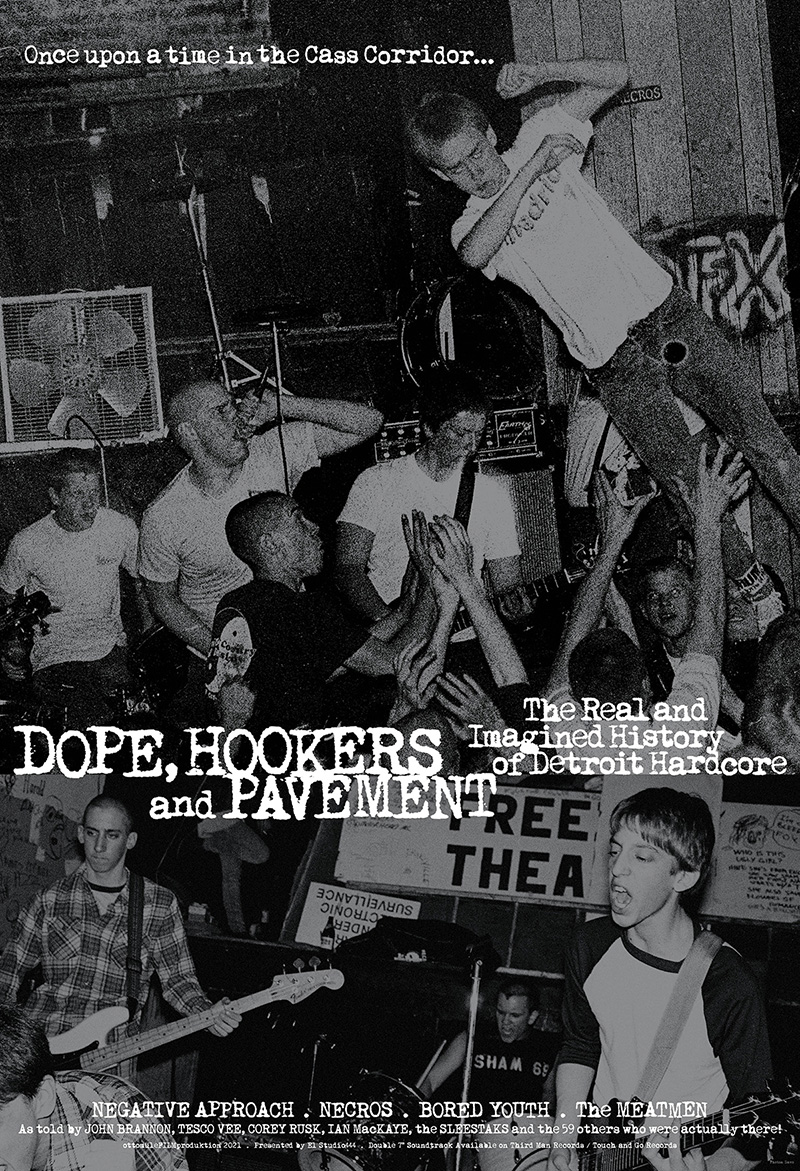
Otto BujŌĆÖs documentary Dope, Hookers and Pavement: The Real and Imagined History of Detroit Hardcore starts with a series of interviews that all but say the music wasnŌĆÖt that important. It may seem odd to undercut a core element of the scene youŌĆÖre documenting ŌĆö in this case, the speedy, harsh style of punk known as hardcore ŌĆö but director Buj has a reasonable explanation.
ŌĆ£To me, the relevance of the story is less about the music and more about how these kids pulled together from all over southeast Michigan and Windsor to build their scene/community and an environment to create their music when one didnŌĆÖt exist for them,ŌĆØ Buj says. ŌĆ£As Ian MacKaye [of Washington, D.C.ŌĆÖs Minor Threat and later Fugazi] says at the conclusion of the film, the ŌĆśmusic was just a currency.ŌĆÖ ŌĆØ
ŌĆ£The scene is what happens outside the gig,ŌĆØ MacKaye says in the documentary. ŌĆ£ThatŌĆÖs where the real social fabric is being knit. I think there was an enormous amount of really thoughtful people ŌĆö men and women, boys and girls ŌĆö who were sitting on the curb making this sort of scene something that was more connected than most people realize. Detroit rock city, right?ŌĆØ
MacKaye describes Detroit at the time as a central energy hub that helped fuel the rest of the countryŌĆÖs hardcore scenes with its DIY spirit. Dope, Hookers and Pavement focuses primarily on 10 months spanning 1981-1982 when that musical currency was exchanged in dive bars such as WindsorŌĆÖs Coronation Tavern, the Endless Summer Skateboard Park in Roseville, and DetroitŌĆÖs The Freezer Theater at 3958 Cass Ave.
The Freezer became the clubhouse for early Detroit hardcore because anybody could get in, an important detail since a large share of the audience and the bands themselves were teenagers. The building was a dilapidated, empty box with no plumbing or electricity ŌĆö an electric cord was run into The Freezer from a nearby business. But people such as Corey Rusk, who initially played bass with Necros and later turned Touch and Go Records into one the greatest American independent music labels, pitched in to build a stage and turned The Freezer into a short-lived hardcore hub.╠²
BujŌĆÖs documentary features reminiscences from Negative ApproachŌĆÖs John Brannon (later of Laughing Hyenas and Easy Action) and The MeatmenŌĆÖs Tesco Vee, as well as members of Necros, Bored Youth, The Fix, and other people who were part of DetroitŌĆÖs early hardcore scene, which wasnŌĆÖt well documented because, Buj says, ŌĆ£I think it all just happened so fast. ŌĆ” Documenting anything for posterity was not top of mind amongst all the kids involved.ŌĆØ
But while digging through old home movies, Buj stumbled across a silent film his older brother had shot of The Fix playing The Freezer, the only known footage inside the venue. That discovery is what prompted Buj, a Windsor-based filmmaker, to begin the two-year process of making Dope, Hookers and Pavement, which is what Brannon jokes in the film were the only things in the Cass Corridor at the time.╠²
The doc, which premiered at the 2020 Freep Film Festival and is now available to stream at ($10), shows the transition of DetroitŌĆÖs underground music scene from punk to hardcore and its eventual splintering as negative forces such as drugs and Nazi skinheads made things a little more dangerous. With 70-plus interviews, Buj had plenty of talking-head material to work with, as well as show flyers and photos to capture the spirit of the moment even without the benefit of concert footage.
ŌĆ£During that early period,ŌĆØ Buj says, ŌĆ£the Detroit hardcore kids were setting the mold, establishing the template for what was to follow in the city after they had all moved on to other things. It was a scrappy, magical, and intensely creative and resourceful time. ŌĆ” Other than what was happening in California and Washington, D.C., at the time, there really wasnŌĆÖt much of a precedent for what the Detroit hardcore kids were doing in 1981.ŌĆØ
Dope, Hookers and Pavement helps document an overlooked part of DetroitŌĆÖs music legacy and helps place it in the company of Motown, The MC5, techno, The White Stripes, and other sonic exports. While Detroit hardcore never achieved the same level of musical influence as groups from D.C., New York City, and Southern California, Buj admits some of those Motor City bands do stand the test of time.╠²
ŌĆ£Today, thereŌĆÖs absolutely no reason I canŌĆÖt esteem Negative Approach the same way I esteem The Kinks or Bad Brains,ŌĆØ Buj says. ŌĆ£TheyŌĆÖre all just great variants on rock ŌĆÖnŌĆÖ roll produced under different circumstances and a range of skill sets, yet wholly authentic, without pretense or polish.ŌĆØ
Sounds a lot like Detroit.╠²
|
| ╠² |
|








